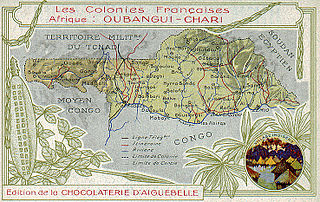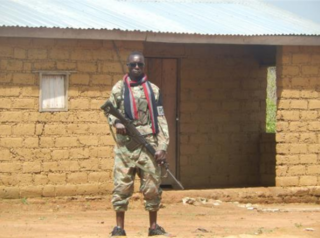
The history of the Central African Republic is roughly composed of four distinct periods. The earliest period of settlement began around 10,000 years ago when nomadic people first began to settle, farm and fish in the region. The next period began around 10,000 years prior.

François Bozizé Yangouvonda is a Central African politician who was President of the Central African Republic from 2003 to 2013.
N'Délé or Ndele is a market town and sub prefecture in the north eastern Central African Republic, lying east of the Bamingui-Bangoran National Park. Ndélé is the capital of Bamingui-Bangoran, one of the 16 prefectures of the Central African Republic. N'Délé had a population of 10,850 as of the 2003 census; and a calculated 2013 population of 13,704.

Boali is a town located in the Central African Republic prefecture of Ombella-M'Poko.
Ouadda is a town located in the Central African Republic prefecture of Haute-Kotto.

The Central African Republic Bush War was a civil war in the Central African Republic which lasted from 2004 to 2007 between Union of Democratic Forces for Unity (UFDR) rebels and government forces. The rebellion began after François Bozizé seized the nation's presidency in 2003. Actual fighting began in 2004. Around 10,000 people were displaced because of the civil unrest.
Bamingui is a town and sub-prefecture in the Bamingui-Bangoran Prefecture in the northern Central African Republic. It lies on the south bank of the Chari River along National Route 8, 529 kilometres (329 mi) by road northeast of the capital of Bangui. As of 2003 it had a population of 6230 people.

Michel Am-Nondokro Djotodia is a Central African politician who was President of the Central African Republic from 2013 to 2014. He was the first Muslim to hold that office in the predominantly Christian country. Djotodia was a leader of the almost entirely Muslim Séléka rebel coalition in the December 2012 rebellion against President François Bozizé. Following a peace agreement, Djotodia was appointed to the government as First Deputy Prime Minister for National Defense in February 2013. When the peace agreement unravelled, Séléka captured Bangui and Djotodia took power on 24 March 2013. He promised to lead a transition to new elections in which he would not be a candidate, but his time in office was marked by escalating sectarian violence, and he was ultimately pressured into resigning by regional leaders on 10 January 2014.
The Convention of Patriots for Justice and Peace (CPJP) is a rebel group in the Central African Republic (CAR), which was involved in fighting in the Central African Republic Bush War starting in 2004. On June 12, 2011, the CPJP signed a ceasefire with the government of CAR.

The Central African Republic Civil War is an ongoing civil war in the Central African Republic (CAR) involving the government, rebels from the Séléka coalition, and Anti-balaka militias.

General elections were held in the Central African Republic on 30 December 2015 to elect the president and National Assembly. As no presidential candidate received more than 50% of the vote, and following the annulling of the results of the National Assembly elections by the Transitional Constitutional Court, a second round of the presidential elections and a re-run of the parliamentary elections were held on 14 February 2016, with second round run-offs for the parliamentary elections on 31 March.

Séléka CPSK-CPJP-UFDR was an alliance of rebel militia groups that subjugated the Central African Republic (CAR) on 24 March 2013. After its official dissolution in September 2013, the remaining rebel groups became known as Ex-Séléka. Séléka leader Michel Djotodia became the nation's president from March 2013 until his resignation in January 2014. Members of Séléka were almost all Muslim.

The Democratic Front of the Central African People is an anti-government militia in the Central African Republic. It is one of the major combatants in the Central African Republic Bush War and a member of the Séléka CPSK-CPJP-UFDR group that overthrew the national government in March 2013.

The Anti-balaka is an alliance of militia groups based in the Central African Republic in the early 21st century said to be composed primarily of Christians. However, some church leaders have contested the claimed exclusively Christian character of such groups. The Tony Blair Faith Foundation and journalist Andrew Katz have noted that animists also participate in Anti-balaka groups.

Catherine Samba-Panza is a Central African lawyer and politician who served as interim President of the Central African Republic from 2014 to 2016. She was the first woman to hold the post of head of state in that country, as well as the eighth woman in Africa to do so. Prior to becoming head of state, she was Mayor of Bangui from 2013 to 2014. She is a non-partisan politician.
Mahamat Abdoul Kadre Oumar, better known as Baba Laddé is a Chadian Fulani rebel opposing the Chadian regime of Idriss Déby. He is sometimes referred to as Abdel Kader Baba Laddé.
People’s Resistance Movement for the Refoundation of the Central African Republic is the main organization claiming to be the political representatives of the anti-balaka rebels. It is led by Levy Yakete. In March 2013, President François Bozizé was overthrown in the Central African Republic conflict by a mostly Muslim rebel coalition known as Séléka. The MRPRC was created at that time to resist the Muslim nomads and restore Bozizé to power. A series of atrocities in early 2014 committed by anti-balaka led the United Nations to condemn Yakete and the anti-balaka movement.

Operation Sangaris was a military intervention of the French military in the Central African Republic, from late 2013 till 2016. It was the seventh French military intervention there since the independence of the country in 1960. On 30 October 2016, France announced it officially ended Operation Sangaris.

The Bangui National Forum was a national reconciliation conference organized by the transition government of the Central African Republic (CAR). It took place in Bangui from May 4 to 11, 2015 and was part of the third phase of the Brazzaville process. Following the Brazzaville ceasefire conference of July 2014 and the CAR popular consultations during the first quarter of 2015, the forum resulted in the adoption of a Republican Pact for Peace, National Reconciliation and Reconstruction in the CAR and the signature of a Disarmament, Demobilisation, Rehabilitation and Repatriation (DDRR) agreement among 9 of 10 armed groups.
As many as 10,000 children were used by armed groups in the armed conflict in the Central African Republic (CAR) between 2012 and 2015, and as of 2016 the problem persists nationwide. The mainly Muslim “Séléka” coalition of armed groups and the predominantly Christian, "Anti-Balaka" militias have both used children in this way; some are as young as eight.












